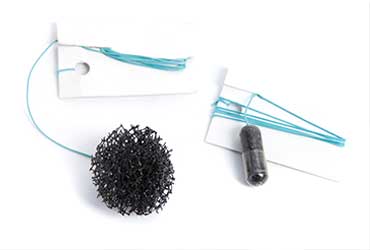Chemotherapy Sponge
Biomedical product researchers in the United States may have found an effective way to help clean up the toxins left in the body during chemotherapy treatment. The idea behind the “sponge-like” device is to absorb chemotherapy drugs that may leak into the bloodstream. This unwanted leakage is extremely risky, especially for cancer patients whose immune systems are already weak, and could negatively impact otherwise healthy organs and tissues near the cancer site.
The innovative device is produced with 3-D printing technology and is highly customized to fit the vein where the chemotherapy is administered. Thanks to a polymer coating with a porous surface, the sponge can absorb the stray toxic agents that miss the targeted tumor or tissue. The sponge acts much like a stent in the vein – it would be inserted for a short time (usually a few hours) and removed once the chemotherapy session is finished.
Traditionally, chemotherapy agents are injected directly into a patient’s general bloodstream resulting in a wide scope. More recently, cancer specialists with some connection to researchers at UC, Berkeley, and UCSF in California where the device is being developed, have been treating cancer patients using catheters inserted in the veins for a much more targeted approach. Even with these focused measures, doctors have seen that a significant amount of the drug dose leaks out of the targeted organ, and subsequently reaches other unwanted parts of the body. This sponge would be inserted in the vein “behind” the organ to catch a percentage of the excess.
Since liver cancer is most commonly treated in this intra-arterial way, researchers are using this as a starting point for clinical trials. So far, the device has been tested on animals, where the sponge was able to catch about 64 percent of the leaked drugs. The initial findings are so encouraging that researchers hope the next step will be to go straight to clinical trials on human patients. They hope to expand these trials to cases involving kidney and brain tumors in addition to liver cancer.
This drug sponge shows promising possibilities to develop less-invasive and gentler medical devices. Stay tuned for more innovative aides in cancer treatment.

